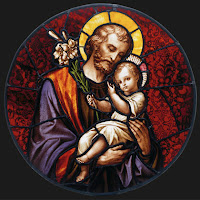
On this Feast of St.Michael the Archangel, our thoughts are raised towards the reality of spiritual warfare. St. Teresa of Jesus has this to say:
hostiam puram + hostiam sanctam + hostiam immaculatam

To be sure, the risk of losing it is not unreal. I would like to make two brief points here. The geography of Christianity has changed dramatically in recent times, and is in the process of changing further. Faced with a new form of Christianity, which is spreading with overpowering missionary dynamism, sometimes in frightening ways, the mainstream Christian denominations often seem at a loss. This is a form of Christianity with little institutional depth, little rationality and even less dogmatic content, and with little stability. This worldwide phenomenon -- that bishops from all over the world are constantly telling me about -- poses a question to us all: what is this new form of Christianity saying to us, for better and for worse? In any event, it raises afresh the question about what has enduring validity and what can or must be changed -- the question of our fundamental faith choice.
The second challenge to worldwide Christianity of which I wish to speak is more profound and in our country more controversial: the secularized context of the world in which we Christians today have to live and bear witness to our faith. God is increasingly being driven out of our society, and the history of revelation that Scripture recounts to us seems locked into an ever more remote past. Are we to yield to the pressure of secularization, and become modern by watering down the faith? Naturally faith today has to be thought out afresh, and above all lived afresh, so that it is suited to the present day. Yet it is not by watering the faith down, but by living it today in its fullness that we achieve this. This is a key ecumenical task in which we have to help one another: developing a deeper and livelier faith. It is not strategy that saves us and saves Christianity, but faith -- thought out and lived afresh; through such faith, Christ enters this world of ours, and with him, the living God. As the martyrs of the Nazi era brought us together and prompted that great initial ecumenical opening, so today, faith that is lived from deep within amid a secularized world is the most powerful ecumenical force that brings us together, guiding us towards unity in the one Lord. And we pray to him, asking that we may learn to live the faith anew, and that in this way we may then become one.


The catechetical landscape of the Diocese of Cubao is deteriorating because in spite of the the decrease in the public school population from last year’s 163, 686 students to this year’s 159,740, there is an increase in the number of uncatechized students from last year’s 31, 623 students to this year’s 36, 389. 4, 766 more students this year are added to the increasing number of those who will not hear the teachings of Jesus for this school year. This is due to the decreasing number of catechists this year.
Every September, we celebrate the Catechetical Month. Everytime we do this, we make an appeal for volunteer catechists. Like the landowner in today’s parable, we come out time and again to look for laborers to work in the vineyard. The appeal does not change, it has been repeated year after year: “You go into the vineyard.” It has remained unchanged because the Harvest is rich but the laborers are few. The once-a-week teaching of catechism is already a bad situation because the catechetical instruction does not stand a chance against the constant bombardment our youth receive from elements that are hostile to the gospel of Jesus. This is made worse by the absence of regular parental guidance and even worse still, the lack of catechists..36, 389 might seem to you a faceless numbers. But behind the figures are real human beings who are condemned to ignorance of Jesus Christ and of his truth that sets all men free. Many young people do not seek the Lord because they do not know that He wants to be found. Many young people do not call on the Lord because they do not know that He is near. Being deprived of catechesis, many people are condemned to a linited world view that stretches no further than the here and now. They are deprived of the opportunity to raise their thoughts to the thoughts of God which is higher and wider than ours: “For my thoughts are not your thoughts, nor are your ways my ways, says the Lord. As high as the heavens are above the earth, so high are my ways above your ways, and my thoughts above your thoughts.” And these many people do not know what they are missing. Like slaves that think that everything is fine because they do not know what being free means, many people think that they are satisfied with what the world has to offer because they do not know that they are meant for something more: they are destined to live for ever in heaven.
When we hear these words: You go into my vineyard, we always think that the Lord meant to speak to other people...but not to me. But the Lord is really addressing these words to you! If only parents took seriously their catechetical obligation towards their children, the catechetical situation would not be so bad. We see these signs around us: Aso ko, tali ko; Tapat ko, linis ko. We recognize our responsibility towards our dog and toward our environs. But why do we not recognize our responsibility towards our own children: Anak ko, turo ko! Many parents do not recognize that they are the primary catechists of their own children. Godparents do not recognize that they are the secondary catechists of their godchildren. Many are like the men who, at late afternoon, hear the Lord's reproach: "Why are you standing here idle all day? You go to my vineyard!" Late in life...you have not yet worked in the vineyard? You go to the vineyard!
Dare to respond generously to the invitation of Christ…for the Lord is never outdone in his generosity. Not only does he pay us what is just. He gives us more out of the abundance of his mercy: “Those that glorify and proclaim My great mercy, I shall protect them Myself at the hour of death as My own glory. And even if the sins of soul are as dark as night, when the sinner turns to My mercy he gives Me the greatest praise and is the glory of My Passion. When a soul praises My goodness, Satan trembles before it and flees to the very bottom of hell.” (Diary, 378.)


"The Church, especially when she celebrates the divine mysteries, recognizes and manifests herself as a reality that cannot be reduced to a solely earthly and organizational aspect. It must appear clearly in these mysteries that the beating heart of the community should be recognized beyond the narrow yet necessary limits of ritualism, because the liturgy is not what man does, but what God does with his admirable and gratuitous condescendence. This primacy of God in the liturgical action was highlighted by the Servant of God Paul VI at the closing of the second period of the Vatican Council, when he announced the proclamation of the Constitution Sacrosanctum Concilium: "In this event we observe that the correct order has been respected of the values and duties: thus we have recognized that the post of honor is reserved to God; that as first duty we are called to raise prayers to God; that the sacred Liturgy is the primary source of this divine exchange in which the life of God is communicated to us; it is the first school of our soul, it is the first gift that must be made by us to the Christian people." (Paul VI, Address for the Closing of the Second Period, December 4, 1963, AAS [1964], 34).
"In addition to expressing the absolute priority of God, the liturgy manifests its being "God with us," since "being Christian is not the result of an ethical choice or a lofty idea, but the encounter with an event, a person, which gives life a new horizon and a decisive direction." (Benedict XVI, encyclical Deus Caritas Est, 1). In this connection, God is the great educator of his people, the loving, wise, tireless guide in an through the liturgy, the action of God in the today of the Church."
"From this foundational aspect, the 62nd National Liturgical Week is called to reflect on the educational dimension of the liturgical action, in as much as it is a "permanent school of formation around the Risen Lord, educational and relative place in which the faith acquires form and is transmitted" (Italian Episcopal Conference, Educare alla Vita Buona del Vangelo, n. 390). For this purpose, it is necessary to reflect ever better on the relation between catechesis and liturgy, yet rejecting all undue instrumentalization of the liturgy with "catechetical" ends. In this regard, the living Patristic tradition of the Church teaches us that the liturgical celebration itself, without losing its specificity, always has an important catechetical dimension (cf. Sacrosanctum Concilium, 33). In fact, in as much as it is the "the primary and indispensable source from which the faithful are to derive the true Christian spirit" (ibid., 14), the liturgy can be called the permanent catechesis of the Church, the inexhaustible source of catechesis, precious catechesis in act (cf. Italian Episcopal Conference, Il Rinnovamento della catechesis, Feb. 7, 1970, 113). As an integrated experience of catechesis, celebration and life, it expresses in addition the maternal support of the Church, thus helping to develop the growth of the believer's Christian life and the maturation of his conscience.
"...Organizations in the OSCE countries responsible for notifying the public about cases of Christianophobia regularly report cases of persecution of Christians who criticize social evils, albeit that they are legally recognized. For example, clergy and lay believers who criticize homosexuality as sinful often face public ostracism or severe discrimination. Statutory guarantees of freedom of speech laid down in international law are always ignored in such cases.
"Christians in the OSCE region are consistently attacked because of their position on abortion and euthanasia. Opponents not only fail to see that behind their false justifications lie the deprivation of human life, but they also question Christians’ right to present their views and their democratic efforts to have them reflected in European legislation. It has been an encouragement and inspiration to see the recent recommendation of the Parliamentary Assembly of the Council of Europe upholding the right to conscientious objection for medical workers who refuse to take part in such operations. I hope that refusal on grounds of conscientious objection will be an accepted approach in the educational and in public service spheres."

















